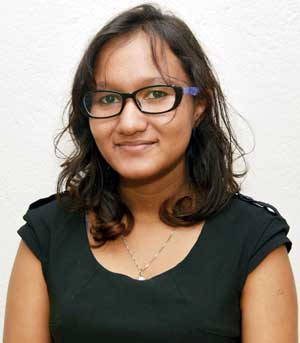Monday Feb 16, 2026
Monday Feb 16, 2026
Thursday, 15 September 2016 00:00 - - {{hitsCtrl.values.hits}}
The development of children through the education system is quintessential because children blossom into young adults and become the next generation
By Natasha Fernando
Sri Lanka is a country with many blessings; free primary, secondary and tertiary education is one of them. Hence, there is 98% youth literacy rate – a great achievement for a middle income country.
Government policy changes have made it compulsory for children to receive education till the age of 16, which contributes to the high literacy rate.
Ministry of Education in 2013 reports that there are only 0.4% schools that offer school education in all three languages Sinhala, Tamil and English. Further it points out that there are only 3.5% national schools while 96.5% are provincial schools. This sheds light on why the Grade 5 scholarship exam is highly competitive, pressurising children to attend a national school which is considered ‘better’ due to its prestige. But it must be also noted that national schools are considered to have better resources and better teachers. Does that mean in provincial schools the situation is otherwise?
In many youth forums, the discussions are almost always about tertiary education in Sri Lanka and the conflict between private and state universities. The focus on the education of children is usually left out. I recently volunteered for an event organised by UNICEF Sri Lanka – ‘A Fair Chance for Every Child’ which was based on the need for equitable, inclusive and quality education for the children of Sri Lanka. This made me reflect on what youth can do to achieve this goal.
Why should education of children matter?
Those who fall between ages 15-24 are considered youth. Then who is a child? According to the Convention on the Rights of the Child, everyone under 18 years is a child. The development of children through the education system is quintessential because children blossom into young adults and become the next generation. ‘Development’ should include physical, psychological, social and cultural development.
Compulsory subjects for children till they finish Ordinary Level examinations include: Environmental Science, Mathematics, Mother Tongue, English as a Second Language, History, Religion, Social Studies and an aesthetic subject. In the ‘Fair Chance for Every Child’ conference, a major concern was that local school curriculums lack emphasis on analytical thinking and problem solving skills, communication and peace education and ICT skills. It is difficult for a child to develop psychologically without such skills. Thus, when they grow to an employable age they do not have employable skills, which is a major flaw in the education system.
I recently watched a video on YouTube titled ‘Kids react to Donald Trump’. Children were asked their opinion of the US presidential candidate and the responses indicated enthusiasm in the politics of their country. The children’s perspective was quite advanced and insightful. This demonstrates why a standard education is important to foster the analytical thinking of children and encourage their civil participation in society when they grow up.
Regional disparities in resource allocation
A school could also allocate time for physical education during school hours, if they have the relevant facilities, so that children could develop team-building and healthy morals. Unfortunately, some schools do not even have adequately-qualified teachers to provide such education. This is quite common in certain parts of the country such as in the remote rural areas, north, east and in the plantation sector.
The delegates at the UNICEF conference raised concerns that most teachers who get appointments to teach in such areas would transfer to suburban areas due to familial obligations and personal commitments. In some cases, teachers do not have proper transport and accommodation when stationed in difficult areas.
Education financing of just 2% of GDP is considered very low and is a major barrier to address those disparities in resource allocation. Another concern is that not all children who enter Grade 1 have received quality pre-school education which is largely private-owned. In rural areas the situation could be much worse due to the lack of qualified teachers. Finding solutions to such problems require substantial resources which must be allocated by the government. However, pointing fingers at the government is not always the solution.
Other actors who can make a difference
Children in rural areas are not exposed to the advanced networks that are open to children in national schools in urban provinces such as Colombo, Kandy, Negombo, Matara, etc. A child from a rural area would not know what types of careers are there for them to engage in, and what type of education they need to get there because schools do not provide such guidance. In recent years there was a wave of news regarding school children abusing narcotics and intoxicants. If such cases were identified in a rural school it is extremely difficult to find proper psycho-social support.
Like schools in developed countries, certain reputed schools in Colombo conduct a programme that identifies intelligent children and puts them into an accelerated program, so they can enter tertiary education at a younger age. This opportunity does not exist for students in rural areas.
However today, there are civil societies, humanitarians and volunteers who are knowledgeable about such problems and can spend some time engaging with communities and conducting relevant programs. I learned so much by volunteering for a conference; it had an impact on me and made me want to raise awareness for the need to act now. Youth can create a ripple effect and help the children who are disadvantaged. Through volunteering and other youth-led initiatives to help deprived communities we can also provide better opportunities for the future generation.
(The writer is a 20-year-old International Studies and Law major from the University of Kelaniya and University of London-International Programmes. Her passions include are learning other cultures, academic research, reading, and writing.)
(UNLOCKED is a space for Sri Lankan youth to express their views and opinions on development with the aim of creating positive change in the world. The views expressed in the blogs are solely those of the authors. UNDP Sri Lanka and Daily FT does not represent or endorse the views expressed in these blogs. Read more about the UNLOCKED initiative www.lk.undp.org.)